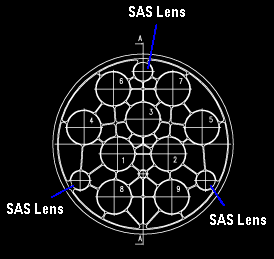 The SAS provides
(1) high-resolution, high-bandwidth aspect information for image reconstruction,
(2) real-time aspect error signals for spacecraft pointing, (3) monitoring
of the relative twist of the two grid trays, and (4) full-Sun white-light
images for coalignment with ground-based images. The SAS is similar to
the aspect system on HEIDI that demonstrated 0.5-arcsec performance at
balloon altitudes. It consists of three identical lens-filter assemblies
mounted on the forward grid tray to form full-Sun images on three 2048
x 13-µm linear diode arrays mounted on the rear grid tray. Simultaneous
exposures of three chords of the focused solar images are made every 10
ms by each of the arrays. A digital threshold algorithm is used to select
four pixels that span each solar limb for inclusion in the telemetry. These
digitized pixel outputs allow six precise locations of the solar limb to
be obtained on the ground by interpolation, thus providing knowledge of
Sun center in pitch and yaw to 1.5 arcsec (3 sigma). The SAS provides
(1) high-resolution, high-bandwidth aspect information for image reconstruction,
(2) real-time aspect error signals for spacecraft pointing, (3) monitoring
of the relative twist of the two grid trays, and (4) full-Sun white-light
images for coalignment with ground-based images. The SAS is similar to
the aspect system on HEIDI that demonstrated 0.5-arcsec performance at
balloon altitudes. It consists of three identical lens-filter assemblies
mounted on the forward grid tray to form full-Sun images on three 2048
x 13-µm linear diode arrays mounted on the rear grid tray. Simultaneous
exposures of three chords of the focused solar images are made every 10
ms by each of the arrays. A digital threshold algorithm is used to select
four pixels that span each solar limb for inclusion in the telemetry. These
digitized pixel outputs allow six precise locations of the solar limb to
be obtained on the ground by interpolation, thus providing knowledge of
Sun center in pitch and yaw to 1.5 arcsec (3 sigma).
When the SAS is
pointing to within ~0.2° of Sun center, simple algorithms using the
limb pixel numbers also provide real-time error signals with ~<10 arcsec
precision to the spacecraft Attitude Control System (ACS). Use of the SAS
in this way for both imaging and pointing avoids problems of coalignment.
The SAS is also used as a solar acquisition sensor with an effective radial
field of view of 46 arcmin by the detection of a single limb in any one
of the three diode arrays.
Although the aspect solution itself is independent of twist, the internal
consistency of the three independent solutions possible with the built-in redundancy provides
a continuous, highly sensitive measure of the relative twist of the upper and lower grid trays
during flight. The SAS aspect requirement of 1.5 arcsec corresponds to a sensitivity to relative
twist of 0.4 arcmin. During prelaunch coalignment tests, this SAS twist measurement is calibrated
against that provided by the Twist Monitoring System (TMS).
The SAS was built by the Paul Scherrer Institute in Switzerland.
|